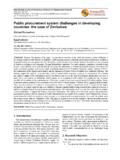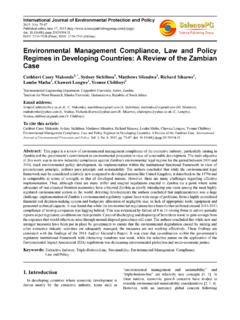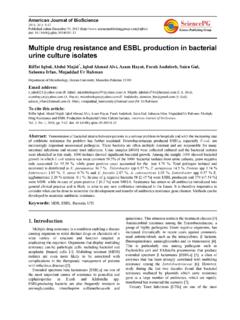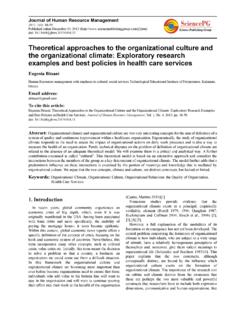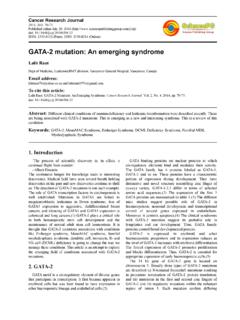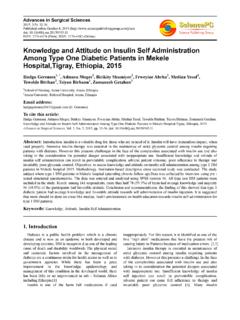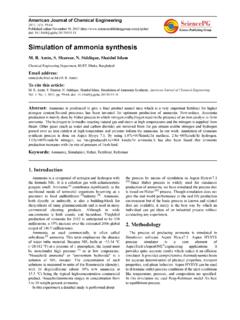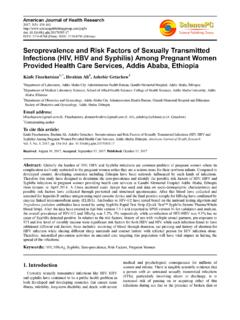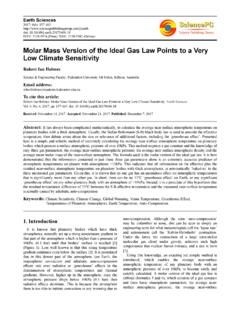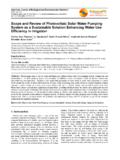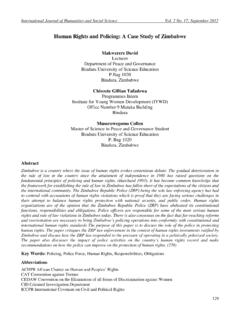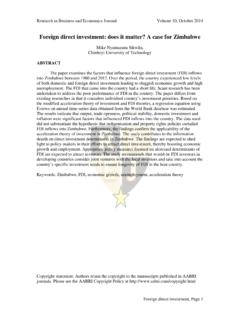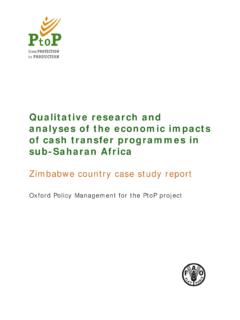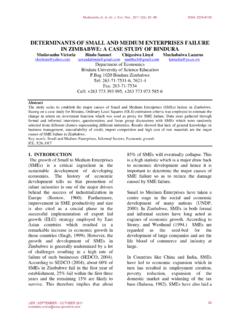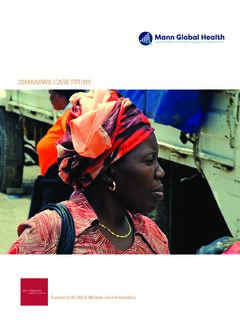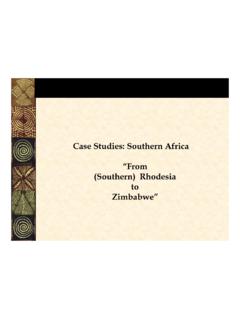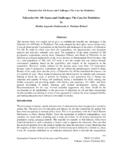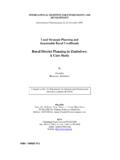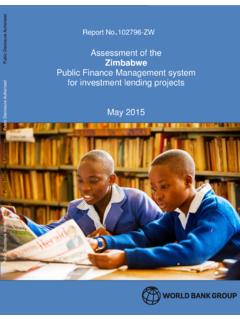Transcription of An Econometric Assessment of the Impact of Inflation on ...
1 Economics 2018; 7(1): 17-22 doi: ISSN: 2376-659X (Print); ISSN: 2376-6603 (Online) An Econometric Assessment of the Impact of Inflation on Economic Growth: A case study of zimbabwe Economy Shame Mukoka Faculty of Commerce, zimbabwe Open University, Harare, zimbabwe Email address: To cite this article: Shame Mukoka. An Econometric Assessment of the Impact of Inflation on Economic Growth: A case study of zimbabwe 7, No. 1, 2018, pp. 17-22. doi: Received: April 6, 2018; Accepted: April 20, 2018; Published: May 16, 2018 Abstract: This study sought to determine the Impact of Inflation on Economic growth in zimbabwe . The time series yearly data for Inflation and Economic Growth (GDP) from 1990 to 2017 were used for the study .
2 Ordinary Least Squares (OLS) was used to determine the Impact of Inflation on Economic growth. Some Stationarity and Cointegration tests were carried out. Data became stationarity after first and second differencing using Augmented Dickey Fuller Test. There was also evidence of cointegration between the two variables using the Johansen Cointegration Test. The results of the study established no relationship between Inflation and Gross Domestic Product in zimbabwe . These results have important policy implications, implying that controlling Inflation is a necessary but not a pre-condition for promoting economic growth in zimbabwe . Thus, the Zimbabwean government should focus on maintaining Inflation at a low rate (single digit).
3 In this regard the study concluded that all factors which cause an increase in the general price levels such as energy (petrol, diesel, gasoline, paraffin), exchange rates volatility, increase in money supply, poor agricultural production and so forth, should be kept on check, with the appropriate policies so as to foster economic growth. Keywords: Inflation , Economic Growth, Terms of Trade, Cointegration and Stationarity 1. Introduction Attaining sustainable economic growth, coupled with price stability continues to be the central objective of macroeconomic policies for most countries in the world fact, for the achievement of the targets of economic and social development, the government of zimbabwe has to face a lot of challenges.
4 As the scenario is made complicated by unstable socio-political background internally, an increasingly globalize international economic environment, giving a meaning of greater amount of exposure to external shocks. Inflation , which is often perceived by many economists as enemy of society, due to its field of activity of increasing pricing of goods and services is one of the macro-economic indicators affecting the country . This paper examines empirically the relationship between Inflation and economic growth (GDP) in zimbabwe . 2. Background of the Problem to the study For many years, the subject that has preoccupied the government of zimbabwe is the economic growth and Inflation rate reduction.
5 Inflation is defined as the increase in the level of prices and economic growth, usually referred to as the gross domestic product (GDP), measuring the market values of a country s final goods in a specified period, with economic growth being defined as the total output of goods and service of a country [1]. An increase in Inflation means that prices would have beenrisen. Thus, with an increase in Inflation , there tend to be a decline in the purchasing power of money, which reduces consumption. This, therefore, would result in the GDP decrease. In fact, high Inflation makes investments less desirable, since it creates uncertainty for the future and also affect the balance of payments as exports become less competitive.
6 As a result, GDP decreases further. It therefore, appears that GDP is negatively related to Inflation . However, there are studies indicating that there 18 Shame Mukoka: An Econometric Assessment of the Impact of Inflation on Economic Growth: A case study of zimbabwe Economy may also be a positive relationship. The Phillips curve, for example, shows that high Inflation is consistent with low rates of unemployment, implying that there is a positive Impact on economic growth [2]. zimbabwe is one of the African economy that has experienced hyperinflation, with the highest rate of % recorded in 2008 [3], against a Gross Domestic Product of [3].
7 This disposition is reminiscent of the high Inflation which the economy experienced from 2000 to 2008 and this constrained much of the industrial production capacity in the country . Most of the commodities in the market have been export products mainly from South Africa which would normally have higher prices than the prices in zimbabwe . Also, the Zimbabwean dollar in the period 2006 to 2008 continued to be under severe pressure on both the official and parallel market exacerbating the Inflation rate [4]. zimbabwe recorded high levels of Inflation , with in 2004, followed by , 72%, and during the period 2006 to 2008 [3]. On the other hand, the country s GDP stood at in 2004 followed by , and during the period extending from 2006 to 2008 [3].
8 Policy makers came up with different market policies that sought to stabilise prices of goods and services. From 2009 to 2017, the country recorded an Inflation average of against an average GDP of , acceptable by all standards [5]. This study is a contribution to the growing literature aimed at understanding the Impact of Inflation on economic growth using zimbabwe data with a more extended and updated period of study 1990 to 2017. 3. Problem Statement Although the causes of Inflation in zimbabwe dates back from pre-colonial era, they were so severe during the period extending from 2004 to 2009 [3]. Some other macro-economic indicators such as unemployment, soared to unacceptable high levels.
9 As if not enough, the introduction of multicurrency in 2009, brought along with some challenges which companies failed to cope. This, henceforth, manifested in the general rise in the price of goods and services, thereby affecting the general welfare of economy s citizens. This study , therefore, seeks to determine empirically the Impact of Inflation on economic growth for the zimbabwe economy. 4. Research Objectives and Hypothesis The objective of this study is to determine the Impact of Inflation on economic growth for the zimbabwe economy. It also seeks to make recommendations that would assist policy makers in managing Inflation at the same time growing the economy.
10 The hypothesis that pinned this study is that Inflation is negatively related to economic growth. 5. Review of Related Literature There is a huge survey of literature, which investigated theoretical and empirical aspects of relationship between Inflation and economic growth. This section presents literature on the Impact of Inflation on economic [6], showed that Inflation and growth are negatively related. More specifically, he argues that growth, investments and productivity are negatively related to Inflation and that capital accumulation and productivity growth are also negatively affected by budget deficits. Moreover, he states that some exceptional cases show that even though high growth is not necessarily associated with low Inflation and small budget deficits, high rates of Inflation are not consistent with permanent growth.
